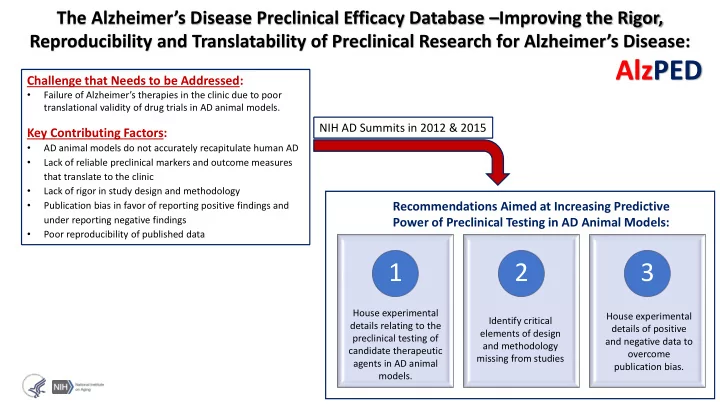

The Alzheimer’s Disease Preclinical Efficacy Database – Improving the Rigor, Reproducibility and Translatability of Preclinical Research for Alzheimer’s Disease: AlzPED Challenge that Needs to be Addressed: • Failure of Alzheimer’s therapies in the clinic due to poor translational validity of drug trials in AD animal models. NIH AD Summits in 2012 & 2015 Key Contributing Factors: • AD animal models do not accurately recapitulate human AD • Lack of reliable preclinical markers and outcome measures that translate to the clinic • Lack of rigor in study design and methodology • Publication bias in favor of reporting positive findings and Recommendations Aimed at Increasing Predictive under reporting negative findings Power of Preclinical Testing in AD Animal Models: • Poor reproducibility of published data 1 2 3 House experimental House experimental Identify critical details relating to the details of positive elements of design preclinical testing of and negative data to and methodology candidate therapeutic overcome missing from studies agents in AD animal publication bias. models.
Responding to the Recommendations: AlzPED: Overview of Scope and Capabilities Alzheimer’s Disease Preclinical Efficacy Database • Provides researchers and information scientists with a facile way to survey existing AD preclinical therapy development literature and raise awareness about the elements of rigorous study design and requirements for transparent reporting . • Currently hosts curated summaries from 917 preclinical efficacy studies published between 1996 and 2019. • Searchable by: • Related Publications (PubMed) • Therapy Type (14 types) • Therapeutic Agents (PubChem/DrugBank) • Therapeutic Agents (804 agents) • Therapeutic Targets (Open Targets/Pharos) • Therapeutic Targets (167 targets) • • Animal Models (Alzforum) Animal Model (174 models) • Related Clinical Trials (ClinicalTrials.gov) • Principal Investigator • Related Patents (Google Patents/USTPO) • Funding Sources • Provides funding agencies with a tool for enforcement of requirements for transparent reporting and rigorous study design. • Provides a platform for creating citable reports/preprints of unpublished studies, including studies with negative data . • Reports on the rigor of each study by summarizing the elements of experimental design.
Elements of Rigorous Experimental Design and Analysis of Reporting Trends Report on the rigor of a study curated in AlzPED: Summary of experimental design and methodology. Reporting trends for the 24 recommended experimental design elements that improve reproducibility and translational value of preclinical studies. Data are presented as percentages calculated from 917 curated preclinical efficacy studies published between 1996 and 2019. Join AlzPED at Poster No. 4 on Wednesday, March 4 th from 5:00PM – 7:00PM Detailed analytics available at: https://alzped.nia.nih.gov/alzped-analytics
AlzPED Team Sage Bionetworks NIA NIH Library Kenneth Daily Shreaya Chakroborty Bridget Burns Mette Peters Zane Martin James King Suzana Petanceska Lorenzo Refolo Ali Sharma Contact Information Erika Tarver Jean Yuan @Alz lzheimers_NIH alzp lzped.nia ia.nih.gov AlzP lzPED alzp lzped@nih ih.gov Partner Organizations
Recommend
More recommend